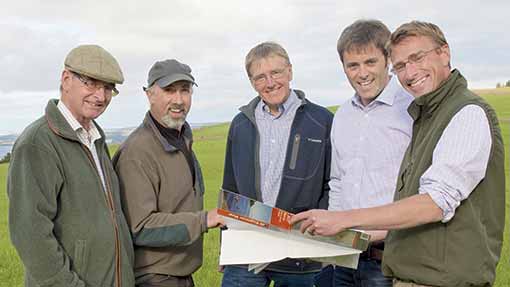Co-op turbine project spreads risk and rewards

Work begins next week on a Highlands farm to build Scotland’s first community-owned co-operative wind turbine.
About £850,000 has been invested by 180 local people for the 250kW project at Knockbain Farm near Dingwall. Here, father and son David and Richard Lockett have 202ha carrying sheep and cattle and grow spring barley.
They originally gained permission for the turbine on their own initiative and the community project grew out of this when an adviser suggested the co-operative approach.
Much of the farm is currently let as David Lockett steps back from day-to-day operations and his son Richard concentrates on the turbine project and his environmental land management consultancy.
Dingwall wind co-op
- 250kW turbine – will generate enough power for 120 houses
- 180 members including landowner
- Investment ranges from £250 to £20,000
- Investment eligible for tax relief
- Pays landowner base rent plus performance-related income
- Took three years from decision to install a turbine to operation
- After 20 years may continue to operate turbine or reinvest
- Sum set aside to cover dismantling and removal of turbine
- Project will donate £2,000 to £8,000 a year to local community fund
The farm business will earn a base site rent of 10% of the turbine income. This will be about £10,000/year, but if the turbine performs according to plan it could be about £16,000/year.
The Lockett family have also invested in the co-op, which pays members 7.4%/year on the whole of their invested capital for 20 years. During the first five years it will pay interest only, then in years six to 20 capital repayments will also be made.
In addition, the funding will give investors tax relief of up to 50% through the Enterprise Investment Scheme and Seed Enterprise Investment Scheme. It will also pay a benefit of £2,000-8,000/year to the local community.
“We chose the co-op route because it enabled us to get a decent return and share in the financial benefits,” said Richard Lockett.
It also means farm assets do not need to be tied up as security for the project.
While raising cash through the community can be hard work and time-consuming, it can be more straightforward than the traditional routes for project finance, says Richard. Community involvement can also help to garner goodwill towards the project.
“As a farmer you could take a more hands-off approach than we did, but I wouldn’t advise someone to go into something like this unless they like the idea of a co-op and are prepared to help it succeed. You can’t stand on the sidelines and just expect it to happen.
“We had a paltry marketing budget but in the end we raised 15% more cash than we needed with a few days to spare and had to repay some of it. Seventy-five percent of the members live within 15 miles of the site.”
Mr Lockett thinks that as more wind power is installed, with a resulting decrease in new FiTs rates, community finance is likely to become a more secure route than traditional borrowing for farm-based renewable energy.
“If I was advising other farmers on taking this approach, I’d say it delivered a lower return than undertaking the project yourself, but it’s also lower risk and you’re not borrowing against the farm.”
The project had help from Sharenergy, a co-op whose purpose is to help set up community schemes and which did background and advisory work for the Dingwall Wind Co-op and the share offer.
Sharenergy is also about to launch a second 250kW turbine project next week. The Wester Derry Wind Co-op will use the same co-op structure as the Dingwall venture.
Community funding was attractive to landowners for lots of reasons, said Sharenergy director John Halle, who is also a director of Dingwall Wind Co-op.
“Farmers have an interest in the community – it’s where they work, their staff come from the community and the local community is often their market,” he said.
“A community project also offers an alternative funding route, especially as many farms would already be mortgaged. Co-ops can also offer the same kind of or a better rental than many commercial leases would offer.”
